Related Research Articles

Wright Aeronautical (1919–1929) was an American aircraft manufacturer headquartered in Paterson, New Jersey. It was the successor corporation to Wright-Martin. It built aircraft and was a supplier of aircraft engines to other builders in the golden age of aviation. Wright engines were used by Amelia Earhart and Charles Lindbergh. In 1929, the company merged with Curtiss Aeroplane and Motor Corporation to form Curtiss-Wright.

Elbert Leander "Burt" Rutan is a retired American aerospace engineer and entrepreneur noted for his originality in designing light, strong, unusual-looking, and energy-efficient air and space craft. He designed the record-breaking Voyager, which in 1986 was the first plane to fly around the world without stopping or refueling. He also designed the Virgin Atlantic GlobalFlyer, which in 2006 set the world record for the fastest and longest nonstop non-refueled circumnavigation flight in history. In 2004, Rutan's sub-orbital spaceplane design SpaceShipOne became the first privately funded spacecraft to enter the realm of space, winning the Ansari X-Prize that year for achieving the feat twice within a two-week period.

The Cessna O-2 Skymaster is a military version of the Cessna 337 Super Skymaster, used for forward air control (FAC) and psychological operations (PSYOPS) by the US military between 1967 and 2010.
The Mitchell U-2 Superwing is an American tailless ultralight aircraft that was designed by Don Mitchell for amateur construction.
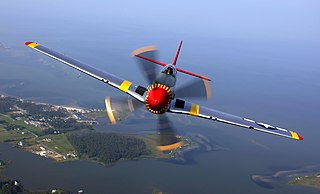
An airplane or aeroplane, informally plane, is a fixed-wing aircraft that is propelled forward by thrust from a jet engine, propeller, or rocket engine. Airplanes come in a variety of sizes, shapes, and wing configurations. The broad spectrum of uses for airplanes includes recreation, transportation of goods and people, military, and research. Worldwide, commercial aviation transports more than four billion passengers annually on airliners and transports more than 200 billion tonne-kilometers of cargo annually, which is less than 1% of the world's cargo movement. Most airplanes are flown by a pilot on board the aircraft, but some are designed to be remotely or computer-controlled such as drones.

The Wings Over the Rockies Air and Space Museum (WOTR) is located on the former Lowry Air Force Base in Denver, Colorado, United States. The museum preserves the history of Lowry AFB's operations from 1938 to 1994 in its collections, archives, and research library.
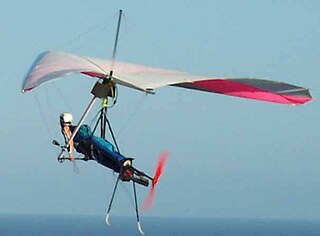
A foot-launched powered hang glider (FLPHG), also called powered harness, nanolight, or hangmotor, is a powered hang glider harness with a motor and propeller in pusher configuration. An ordinary hang glider is used for its wing and control frame, and the pilot can foot-launch from a hill or from flat ground, needing a length of about a football field to get airborne, or much less if there is an oncoming breeze and no obstacles.

The flight endurance record is the longest amount of time an aircraft of a particular category spent in flight without landing. It can be a solo event, or multiple people can take turns piloting the aircraft, as long as all pilots remain in the aircraft. The limit initially was the amount of fuel that could be stored for the flight, but aerial refueling extended that parameter. Due to safety concerns, the Fédération Aéronautique Internationale (FAI) no longer recognizes new records for the duration of crewed airplane or glider flights and has never recognized any duration records for helicopters.

This listing of flight altitude records are the records set for the highest aeronautical flights conducted in the atmosphere, set since the age of ballooning.

The National Soaring Museum (NSM) is an aviation museum whose stated aim is to preserve the history of motorless flight. It is located on top of Harris Hill near Elmira, New York, United States.
Don Mitchell may refer to:

The Monnett Moni is a sport aircraft developed in the United States in the early 1980s and marketed for homebuilding.
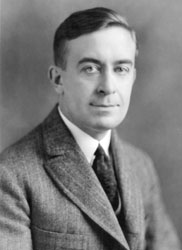
Alfred Victor Verville was an American aviation pioneer and aircraft designer who contributed to civilian and military aviation. During his forty-seven years in the aviation industry, he was responsible for the design and development of nearly twenty commercial and military airplanes. Verville is known for designing flying boats, military racing airplanes, and a series of commercial cabin airplanes. His planes were awarded with the Pulitzer Speed Classic Trophy in 1920 and 1924.

Walter J. Boyne was a United States Air Force officer, Command Pilot, combat veteran, aviation historian, and author of more than 50 books and over 1,000 magazine articles. He was a director of the National Air and Space Museum of the Smithsonian Institution and a Chairman of the National Aeronautic Association.
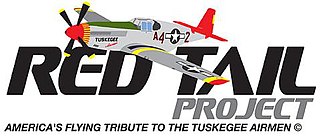
The Red Tail Squadron, part of the non-profit Commemorative Air Force (CAF), known as the Red Tail Project until June 2011, maintains and flies a World War II era North American P-51C Mustang. The twice-restored aircraft flies to create interest in the history and accomplishments of the members of the World War II-era 332nd Fighter Group, also known as the Tuskegee Airmen, whose distinctive red markings on the tails of the P-51s they flew during that war, gave the organization its name.

The Bowlus BA-100 Baby Albatross is an American high-wing, strut-braced, open cockpit, pod-and-boom glider that was designed by Hawley Bowlus and introduced in 1938.
The Mitchell Nimbus is a series of American, single-seat, high-wing gliders that was designed by Don Mitchell in the 1950s. Mitchell is also well known for his ultralight Mitchell Wing A-10 and U-2 designs.
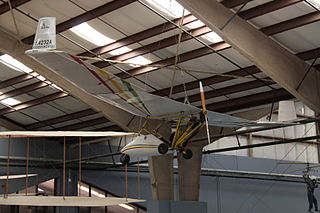
The Mitchell Wing B-10 is an American high-wing, open cockpit, single-seat, tailless, ultralight aircraft and motor glider designed by Don Mitchell and based on his Mitchell Wing hang-glider. It has been produced by a variety of companies in the form of kits and plans for amateur construction. It first flew in 1980.
References
- ↑ "National Soaring Museum | Soaring Museum - Hall of Fame - Donald S. Mitchell".
- ↑ "Mitchell U-2 Superwing | National Air and Space Museum".
- ↑ "MitchellWing - Mitchell Wing, Aircraft, Ultralight Aircraft for Sale". Archived from the original on 2020-08-07. Retrieved 2020-07-18.
- ↑ "Mitchell Warr B-10".
- ↑ "Mitchell Nimbus". Archived from the original on 2018-06-12. Retrieved 2018-06-10.
- ↑ "Mitchell U-2 Superwing | National Air and Space Museum".
- ↑ "Mitchell Wing A-10 | Light Aircraft DB & Sales".